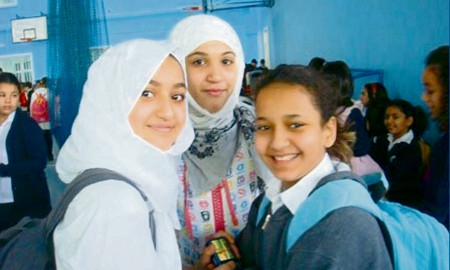In the past, many Kuwaiti parents concerned with their children’s education opted to send their children to boarding schools abroad. Today, the panorama is quite different, with the quality of education on the rise and more and more private schools introducing Western curricula.
The Universal American School (UAS) is a private nursery and K-12 school, that was originally founded in 1976 by the parents of Noura Al Ghanim, the current owner and director of UAS, “because they wanted to contribute to the community and do something very effective for the country. In that sense there is nothing better than educating people.”
Come the invasion, the school was forced to close and the Iraqi forces occupied the school grounds for seven months. In May 1991, Mrs. Al Ghanim returned with her husband and recruitment consultant to start over again.
“The infrastructure of the building itself was not destroyed but everything inside was a mess and everything had been looted. There was nothing left but a few books, which were being used as cooking fuel,” she recalls.
By September they had managed to get the UAS up and running again with some 200 students. In 2003, the government awarded the schools with two acres of land in Hawalli, a suburb of Kuwait City, and it was there that a $14 million, 54,000 square-foot building was erected that today hosts some 1,750 students.
The UAS’ impressively distinctive blue block building has two underground floors, a ground floor and rises five stories. Its state-of-the-art facilities include three swimming pools, a 400-seat auditorium, an indoor gymnasium and sports hall, three band rooms, a 25,000-volume strong library, four science labs, a well-equipped health center with a full-time doctor and two nurses, computer labs, and wireless Internet access throughout the premises.
Mrs. Al Ghanim says the U.S. curriculum is used because it “proved itself in building the personality, tools, and skills of a child. It better suits Middle Eastern children where there is a lot of potential, which needs more personality development along with academic building.”
She also praises the way the American curriculum gives strength to the relationship between student and teacher, as well as between parents and school.
Accredited by the Council of International Schools and the New England Association of Schools and Colleges, the UAS offers 12 Advanced Placement (AP) courses and a wide range of extracurricular activities, including drama, fine arts, music, journalism, model UN, and computer club, as well as sports such as track and field, basketball, soccer, badminton, volleyball.
According to the school’s owner, nearly 80% of the school’s faculty hails from America and the UAS has a U.S.-based consultant who recruits and promotes the school year-round. “We also carry out local recruiting here and attract teachers from all around the world through advertisement and word-of-mouth. In order to get the best teacher or best administrator possible, recruitment must take place year-round,” she adds.
Moreover, staff who move to Kuwait generally do not regret it. “When the majority of the faculty who come to work in Kuwait leave the country, a big number of them find it difficult to live somewhere else. The quality of life here is completely different than any country in the region. It’s incomparable,” boasts Mrs. Al Ghanim.

0 COMMENTS